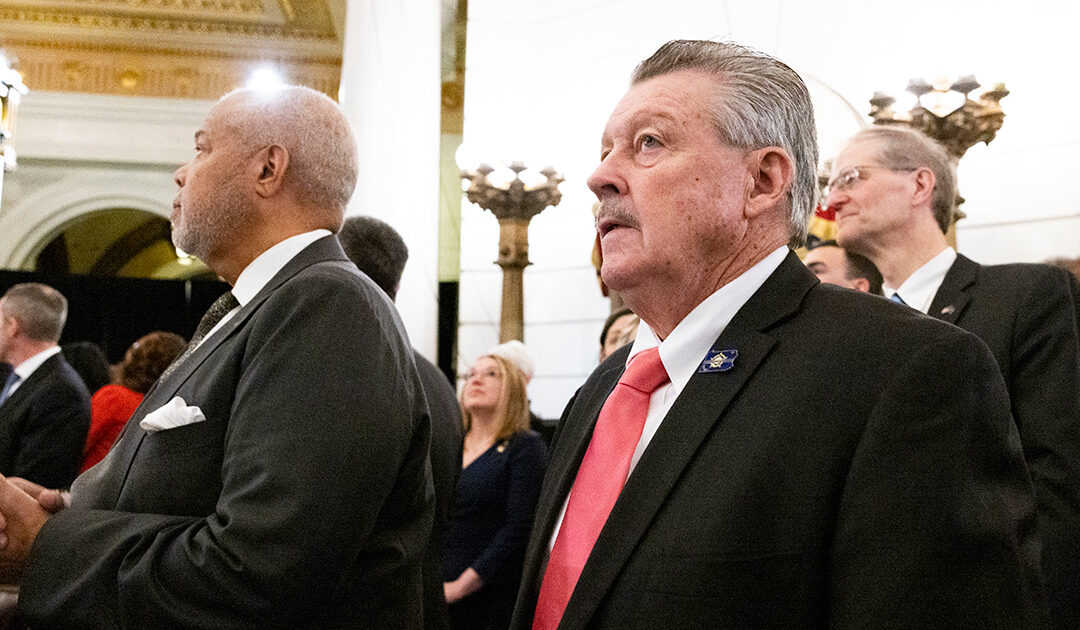
February 6, 2024
Harrisburg, February 6, 2024 – State Sen. Jim Brewster released the following statement today on Gov. Josh Shapiro’s $48 billion 2024-25 budget proposal:
“The budget that the governor outlined today carries the promise of historic progress on challenges that have for too long prevented Pennsylvania from achieving the type of security and prosperity that is possible in a commonwealth blessed with natural resources as well as a resourceful work force.
“With a proposed increase of another $1.4 billion top of last year’s record commitment to basic education, this spending plan could end years of our state languishing in the bottom tier with states who compete for 21st century jobs with a 20th century funding system.
“The governor’s proposal also helps ensure that new education dollars will not be poured into schools that are unhealthy, unsafe and unfit for service to our students. School security has been a long-held priority of mine and I’m looking forward to working with the administration to direct the funds where they are most needed and most wisely spent.
“It is also encouraging to see that the allocation of Pennsylvania’s record surplus will not end at the school grounds and will find its way into communities and local industry where efforts to provide opportunity will see new investments.
“From the hundreds of proposed new state troopers to the additional $37 million for violence prevention programs, the budget offers a blueprint for the General Assembly to help local communities deal with the scourges of violence and drug abuse.
“In his address, the governor expressed his strong support for the labor movement that made Pennsylvania and the Mon Valley an economic powerhouse in the 20th century and provides the potential for similar future partnerships which ensure that prosperity is equally allocated for all who contributed to its creation.
“There is certainly a lot to like about the direction this budget takes us, but it will take some time over the next few months to create legislation from this broad outline.
“Like the governor, it is my hope that we can do this in a bipartisan fashion that recognizes our common strengths and our common challenges.’

December 18, 2019
Harrisburg – December 18, 2019 – Sen. Jim Brewster (D – Allegheny/Westmoreland) said today that $1,146,950 has been awarded for various railway track upgrades and expansion projects in the region.
“The railways that serve the industrial facilities of our region remain as critical components of highly integrated rail network,” Brewster said. “I am pleased that the state has made this significant investment that will help businesses in the area and create an environment that is conducive to job creation.”
U.S. Steel Corporation has been awarded $689,500 to complete rail track updates to accommodate their new hot rolling mill in Braddock.
Union Railroad was awarded $457,450 to construct new railway track and a new rail turnout that will also serve U.S. Steel’s new hot rolling mill.
PennDOT will be distributing the funds for the projects.
“I will continue to push for investments in railway and manufacturing operations,” Brewster said.

January 16, 2019
Harrisburg – January 16, 2019 – Education Partnership Grants to improve technical career training have been approved for projects in Allegheny and Westmoreland counties, said Sen. Jim Brewster (D-Allegheny/Westmoreland).
Westmoreland/Fayette Business Education Partnership and Three Rivers were approved for grant funding to help implement programs that will demonstrate the importance of technical careers to students and help those interested in technical careers prepare for post-secondary education and apprenticeship opportunities.
“STEM and technical careers are essential to our local and state economy,” Brewster said. “It is important that we continue to fund education programs that offer students pathways into these career fields.”
Westmoreland/Fayette Business Education Partnership was awarded $127,050 to develop technology projects and interactive programs that will allow students to explore and prepare for post-secondary education and careers within the STEM field. The programs, which will serve 600 K-12 students in the Westmoreland and Fayette area, will include both classroom and work-based learning opportunities.
Three Rivers in Allegheny was awarded $115,641 to implement a three-phase conference and networking program that will showcase careers in the building and construction industry.
“Providing students with the opportunity to explore more careers and the chance to gain hands-on experience is a great educational investment,” Brewster said. “I am happy that these local programs have been awarded the funds to help students see more options available to them in their future.”
-30-

January 11, 2019
Brewster, Hughes, Yudichak to introduce comprehensive legislative package
Harrisburg – January 11, 2019 – Three Democratic state senators today announced a comprehensive package of legislation aimed at sparking a rapid and sustained expansion of Pennsylvania’s manufacturing sector.
State Sens. Jim Brewster (D-Allegheny/Westmoreland), Vincent J. Hughes (D-Philadelphia/Montgomery) and John Yudichak (D-Luzerne/Carbon) said they will sponsor legislation that would better focus state efforts to develop manufacturing opportunities and create jobs.
“We need to focus our efforts and address all aspects of economic development, including manufacturing,” Hughes said. “We have to do better coordinating our efforts, funding job training, purchasing new equipment and investing in communities in need.
“Manufacturing is a large and important part of our economy and it needs to continue to grow and develop. Our urban and rural areas are heavily dependent on this sector of our economy.”
According to the Center for Manufacturing Research, 12 percent of Pennsylvania’s gross state product is directly related to manufacturing with more than 550,000 workers engaged. Manufactured products account for $33 billion annually in exports.
Yudichak’s legislation calls for the creation of a “Chief Manufacturing Officer” within the governor’s office and a “Manufacturing Competitiveness Board” to help craft an overall manufacturing strategy.
“A chief manufacturing officer would serve as a strong advocate for manufacturing at the highest level of state government,” Yudichak said. “The individual who serves in that position should be well-schooled in the development of manufacturing strategies, especially as it relates to rural areas.”
A key aspect of growing the manufacturing sector is having capital on hand to help businesses invest in new equipment and training. Brewster’s legislation would channel up to $5 million in state grants for vocational technical schools, vocational programs and equipment purchases from the state’s Machinery and Equipment Loan Fund. The proposal would increase the maximum loan amount from $5 million to $7.5 million and authorize loans to retrofit equipment.
“This grant program is essential for vocational schools and small businesses,” Brewster said. “The grants would allow schools to purchase state-of-the-art equipment to train a new generation of skilled workers.”
Over the next decade, nearly 3.5 million manufacturing jobs will likely be needed, and 2 million are expected to go unfilled due to the skills gap, according to Deloitte and the Manufacturing Institute.
Hughes’ legislation would expand the Manufacturing Tax Credit by lifting the credit cap to $12.5 million from its current $4 million. A portion of the tax credit – up to $2.5 million – would be set aside for businesses in distressed communities. It would also be used for disadvantaged, minority, women and veteran-owned businesses.
Brewster said that the investment in manufacturing pays dividends for Pennsylvania’s workers. The average annual compensation for manufacturing employees in Pennsylvania in 2016 was $72,151. The average statewide salary for non-manufacturing and nonfarm business in Pennsylvania in 2016 was $49,059, according to National Association of Manufactures – State Data.
“We must have investments in manufacturing to ensure that Pennsylvania has a well-rounded and diverse economy,” Brewster said. Brewster’s Senate district includes many areas dependent on heavy manufacturing operations in the Monongahela and Allegheny River valley’s in Allegheny and Westmorland Counties.
Yudichak, who is from Northeast Pennsylvania, has a diverse district that includes manufacturing operations in cities and rural areas. He said it was critical that Pennsylvania policy stay current with national and international economics.
“A small manufacturing business, often located in a rural area, produces products that are used in goods manufactured all over the world,” Yudichak said.
The changing world economic landscape has altered how manufacturing is being developed and sustained in the United States. In 2015, compared to urban areas, manufacturing represented a greater share of both private nonfarm rural jobs (14 percent vs. 7 percent) and rural earnings (21 percent vs. 11 percent) according to the U.S. Department of Agriculture.
While the legislation was also introduced last session, the Democratic senators said they are hopeful they can advance the legislative package this year. They said will question state officials about their commitment to manufacturing during the upcoming budget hearings.
-30-
July 5, 2016
Harrisburg, July 5, 2016 − The state Senate adopted a resolution sponsored by state Sen. Jim Brewster (D-Allegheny/Westmoreland) that urges the President and other federal officials to strongly enforce trade laws to protect the domestic steel industry from unfair foreign competition.
“The domestic steel industry is in dire need of help from Washington,” Brewster said. “We are being inundated with subsidized imports from foreign countries.
“Federal officials need to recognize the problem and prevent cheap foreign-made steel from taking jobs away from steelworkers and bankrupting steel companies.”
Finished steel imports increased by 36 percent in 2014 and captured 29 percent of the steel market in 2015. Domestic steel shipments declined 12 percent in 2015 and plant capacity was running at just 70 percent.
“The playing field is tilted toward China and other countries that subsidize steel manufacturing,” Brewster said. “The result is that our own steel industry is at a severe competitive disadvantage.”
Brewster said that steel industries and their suppliers account for more than 1 million jobs. There are approximately 136,000 jobs that are related to steel manufacturing in Pennsylvania.
Two years ago, U.S. Steel announced that it was mothballing a steel manufacturing facility in McKeesport with the result that 250 workers lost their jobs.
“The United States has a wide-open market for steel and this policy has resulted in job loss and plant closures,” Brewster said. “It is patently unfair for foreign countries to subsidize steel manufacturing and then dump the product here.”
The lawmaker has introduced a package of bills (Senate Bill 417, Senate Bill 418, Senate Bill 419) designed to ensure that domestic steel is being used in shale drilling activities.
Brewster’s resolution was approved on June 30.
-30-
February 4, 2014
Harrisburg – February 4, 2014 – State Sen. Jim Brewster said today that Gov. Tom Corbett’s proposed $29.4 billion budget for Fiscal Year 2014-15 falls short of the mark on education, jobs, human services funding and health care.
“I am very disappointed that the governor did not include a sustainable and responsible funding plan for schools so we can address the huge disparity that we now face as a result of his $1 billion in cuts,” Brewster (D-McKeesport) said. “The governor also failed to include a real investment plan for job creation or human services that would help reverse the negative spiral that Pennsylvania is now experiencing.”
[hdvideo id=42]
Brewster said Corbett’s budget includes a new $241 million Ready to Learn Block Grant, which is an increase over the current $100 million, and he called for modest increases in special education, pre-kindergarten and hybrid learning.
According to the Mon Valley lawmaker, the proposed funding increase for education only marginally replaces the dollars that were slashed.
“I am very concerned that part of the plan for distributing the new education dollars is through a new funding formula may not be balanced and will actually escalate the funding disparity and plight of economically-troubled schools,” Brewster said. “I am for real investments and real dollars and finding the means to ensure that schools are adequately funded over the long haul.”
Brewster said that he was anxious to learn more about the formula but he was especially concerned that it may actually result in local tax increases.
The plan also includes a request to lower the pension collars from 4.5 percent to 2.25 percent in order to save state $170 million and local schools $130 million.
“The failure of the governor to recognize that we need to focus energy on job creation is disturbing,” Brewster said. “Pennsylvania has gone from 8th in job creation to 48th under this governor.”
Brewster said the proposed spending plan uses short-term funding and one-time revenues to balance the books. He said Senate Democrats recently unveiled a $1.1 billion budget savings and revenue plan that would provide significant resources to invest in education, jobs, health care and human services over the long-term.
As the former mayor of McKeesport, Brewster said he also wished Corbett would have focused more of his budget on local government by increasing local development options.
“The governor didn’t focus on issues impacting economically hard-hit small towns and cities in Pennsylvania,” Brewster said. “I am frustrated that he failed to fully outline programs and policies that would help these communities grow and prosper.”
The spending plan will be examined in detail in a series of budget hearing over the next several weeks.
###
Contact: Tim Joyce
Phone: 412 380 2242
Email: tjoyce@pasenate.com
-30-




